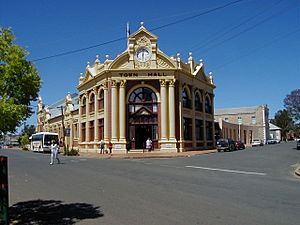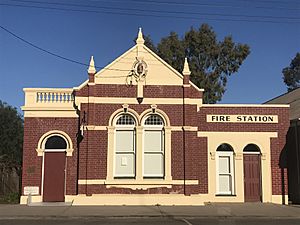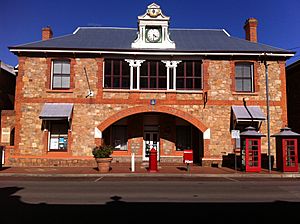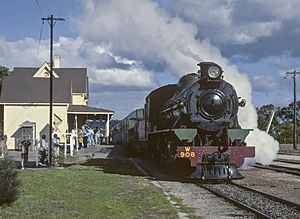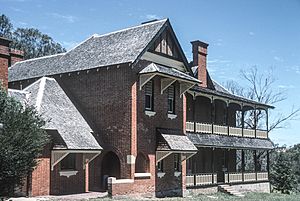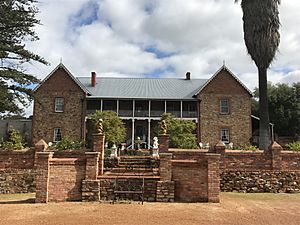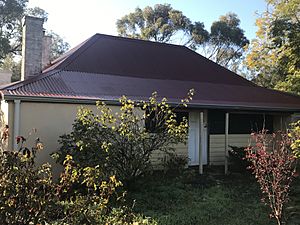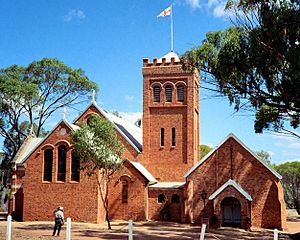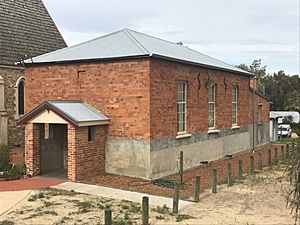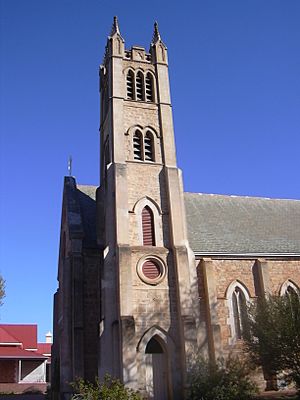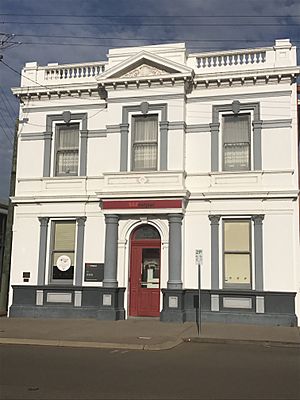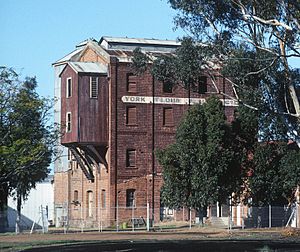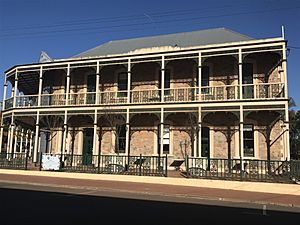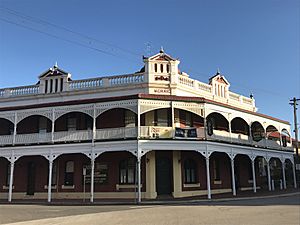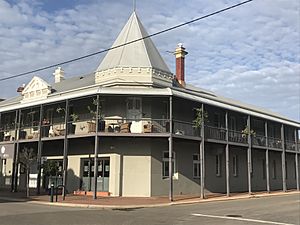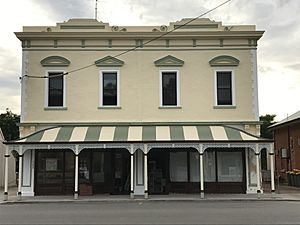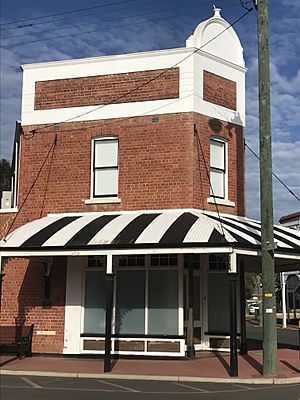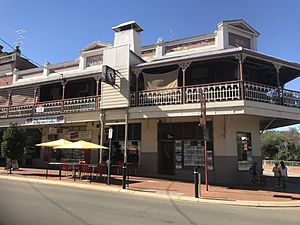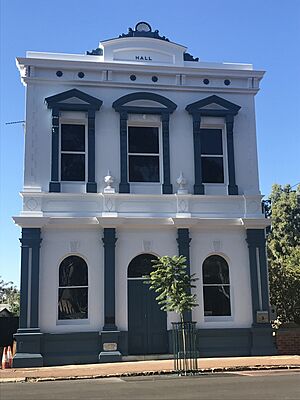List of heritage places in York, Western Australia facts for kids
York, Western Australia, is a town full of amazing old buildings and places. These special spots are protected because they tell us so much about the past. They are listed on different heritage registers, like the State Register of Heritage Places or the Shire of York register. In fact, the whole town of York was named an Historic Town in 1978! Let's explore some of these cool historical sites.
Contents
- Exploring York's Historic Buildings
- Important Public Buildings
- Historic Homes and Cottages
- Places of Worship
- Commercial and Industrial Heritage
- Western Australian Bank: A Historic Bank
- Marwick's Shed: Goldfields Connection
- York Flour Mill: Grinding History
- Imperial Hotel: A Grand Stay
- Castle Hotel: Federation Style
- York Palace Hotel: A Country Classic
- Dinsdale's Shoe Emporium: From Shoes to Backpackers
- Sargent's Pharmacy: Old-Time Medicine
- Central Buildings and Davies Buildings: Historic Shops
- Monger's Trading Post and Sandalwood Yards: Early Industry
- Bridges and Natural Heritage
- Farm Life and Rural Heritage
- Other Interesting Places
Exploring York's Historic Buildings
Important Public Buildings
York Town Hall: A Community Hub
The York Town Hall is a very important building in York. It was built in 1911 and has been a central meeting place for the community ever since. It also holds the York Roll of Honour, remembering local heroes.
Old York Fire Station: From Council to Firefighters
The York Fire Station was first built in 1897 as the Council Chambers for the York Municipal Council. After the new Town Hall was finished in 1911, this building became the fire station in 1912. It's a great example of Federation Free style architecture.
York Post Office: Sending Messages Through Time
The York Post Office was built in 1893 by architect George Temple-Poole. It's designed in the Federation Arts and Crafts style. This building has helped people send letters and packages for over a hundred years!
York Railway Station: A Stop on the Line
The York railway station was once a busy hub for trains. It played a big part in connecting York to other towns and transporting goods and people. It's a reminder of how important railways were in the past.
York Courthouse Complex: Justice in History
The York Police Station, Court House & Gaol is a group of buildings that once served as the town's police station, courthouse, and jail. It's a significant site that shows how law and order were managed in early York.
Old York Hospital: Caring for the Community
The Old York Hospital is a two-storey building from 1896. It was built to provide healthcare for York and the surrounding area. The site also includes other old buildings like the former Morgue, Laundry, Nurses' Quarters, and Maternity Block.
Historic Homes and Cottages
Faversham House: A Grand Old Home
Faversham House is a huge, two-storey stone house that was built and added to between 1837 and 1907. It has almost fifty rooms, making it a rare example of large Colonial architecture. It was home to the Monger family, who were very important in York's history.
Eliza's Cottage: A Tiny Piece of History
Eliza's Cottage was built around 1840. It's a single-storey cottage that shows what homes looked like in the Victorian Georgian style. It's also known as Lookout for Trains Cottage or Burtons Cottage.
Job Bailey's Cottage: Home for a Pensioner Guard
This cottage was built in 1856 for Job Bailey, a pensioner guard and his family. These guards were former soldiers who helped protect the early settlements. The cottage shows early building techniques and has kept its original charm despite some changes over the years.
Langsford House: A Two-Storey Gem
Langsford House is a two-storey brick house built around 1873. It has a timber verandah and a large cellar. It was originally built by W. Langsford and stands close to the road.
Redmile House: Two Homes in One
Redmile House is special because it's actually two separate buildings that form one house. The older part, from 1853, shows how early homes were designed with rooms off a verandah. The newer part, from the 1870s, shows how house designs changed over time.
Brook Cottage: Layers of History
Brook Cottage has a fascinating history, with its original centre section built in 1856 and additions made in the 1890s. It has six rooms on four different levels, showing how it grew over time. It even has shingle lining boards in the ceiling of the oldest part!
Wansbrough House: A Protected Home
Wansbrough House is another important heritage home in York, recognized for its historical value.
Places of Worship
Holy Trinity Church: York's Oldest Church
Holy Trinity Church began construction in 1854 and was officially opened in 1858. It's also known as the Anglican Church. The tower and roof were finished in 1893. It's a beautiful and very old church.
Uniting Church: A Place of Faith
The Uniting Church was formerly the Wesleyan Chapel. It includes the original church from the 1850s (now a hall) and a later, larger church built in 1888. It's an imposing stone building with a decorative spire.
St Patrick's Catholic Church: A Grand Design
St Patrick's Catholic Church was built in 1875. It's a large stone building with a tall tower, designed in the Victorian Academic Gothic style. Italian craftsmen even added the stone porch in 1950.
Commercial and Industrial Heritage
Western Australian Bank: A Historic Bank
The Western Australian Bank was built in 1889 by architect JJ Talbot Hobbs. It's a great example of Victorian Academic Classical style. It later became the Bank of New South Wales and is now Westpac Bank.
Marwick's Shed: Goldfields Connection
Marwick's Shed, also called Marwick's Barn, was built in 1876. It was used to transport supplies to the goldfields before the railway was completed. It's a rare example of 19th-century building techniques, especially how it uses timber to create a large space without internal walls.
York Flour Mill: Grinding History
The York Flour Mill was built in 1892 to mill flour for York and the surrounding areas, and even for export. It's the only mill building left in York, showing how important wheat and grain farming were to the town's success.
Imperial Hotel: A Grand Stay
The Imperial Hotel is a two-storey stone and iron hotel built in 1886. It also had stables and rooms for second-class lodgers. It's a classic example of a grand old hotel.
Castle Hotel: Federation Style
The Castle Hotel is a two-storey brick and iron hotel built in the Federation Filigree style. It's another beautiful example of York's historic hotels.
York Palace Hotel: A Country Classic
The York Palace Hotel was built in 1909. It's a typical country hotel from the early 1900s, showing the architectural style of that time.
Dinsdale's Shoe Emporium: From Shoes to Backpackers
Dinsdale's Shoe Emporium was built in 1887 by William Dinsdale. It has had many uses over the years, including a temperance hotel and a backpackers' hostel. It was restored in 2017.
Sargent's Pharmacy: Old-Time Medicine
Sargent's Pharmacy (fmr) was built in 1904. It's a reminder of how pharmacies used to look and operate in the early 20th century.
Central Buildings and Davies Buildings: Historic Shops
The Central Buildings (1892-1907) and Davies Buildings (1908) are groups of shops along Avon Terrace. They show how commercial areas developed in York, with their unique facades and awnings.
Monger's Trading Post and Sandalwood Yards: Early Industry
Monger's Trading Post (fmr) and the Sandalwood Yards are important because they are the only known complex related to the sandalwood industry in Western Australia that still exists. Sandalwood was a valuable resource in early WA.
Bridges and Natural Heritage
Suspension Bridge: A Swinging Link
The Suspension Bridge, also called the Swing Bridge, was built in 1906. It's a special pedestrian bridge with steel cables and timber decking that crosses the Avon River. It connects the commercial centre of town with Holy Trinity Church. It has even survived floods many times!
Bridge over Blands Brook: A Waterway Crossing
This bridge crosses Blands Brook, a waterway that flows into the Avon River. It's part of the natural landscape and has been an important crossing point for many years.
St Ronan's Well Reserve: An Ancient Watering Hole
St Ronan's Well Reserve is a natural watering place located about 15 km west of York. It was an important stop for travelers as early as 1832, providing fresh water on the road to York.
Farm Life and Rural Heritage
Gwambygine Farm: Pioneer Settlement
Gwambygine Farm and Pool is a historic farm with a homestead dating back to 1836-37. It includes old farm buildings like a stone barn, shearing shed, and stock pens. It's a great example of early farming life in the region.
Balladong Farm Group: A Historic Farm Estate
The Balladong Farm Group includes a farmhouse, a two-storey granary, and a shearing shed. Established in 1848, these buildings show how large farms operated in the past, with their unique timber construction and shingled roofs.
Mile Pool Homestead: Rammed Earth History
Mile Pool Homestead, also known as Craig's Cottage, was built in 1865. The original building was a two-roomed rammed earth cottage, showing early building methods using local materials.
Mt Bakewell Homestead: Prosperous Farming Era
Constructed from 1910, the Mt Bakewell Homestead represents a time when farming in York was very successful. It's a reminder of the region's agricultural past.
Other Interesting Places
Masonic Hall: A Secretive Past
The Masonic Hall was built in 1887. It's an impressive two-storey stone building with a grand front, designed in the Victorian Classical revival style.
York Cemetery: Resting Place
The York Cemetery is a historic burial ground. It's a quiet place that holds the stories of many people who lived in York throughout its history.
York-Beverley Racecourse: Sporting History
The York-Beverley Racecourse is a significant site for local sports history. It has been a place for horse racing and community events for many years.
|


